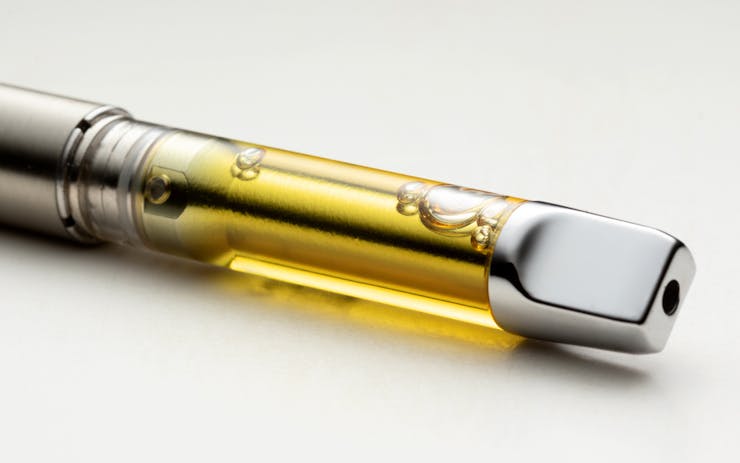Updated Thursday, Aug. 22 at 11:00 a.m. PST
SAN FRANCISCO—Unregulated cannabis vaporizer cartridges tainted with a potentially deadly lung toxin have hospitalized seven people with pneumonia-like symptoms in Hanford, California, officials there reported Wednesday.
The cluster of tainted vape cart poisonings caused the Kings County public health department to issue a rare warning this week urging consumers to avoid buying cannabis e-cigarettes from unlicensed sellers. Street cannabis products are not subject to the rigorous testing that licensed products undergo in California.
'If you’re going to vape THC, get it from a licensed dispensary where you know there’s a certain amount of testing required.'
“If you’re going to vape THC, get it from a licensed dispensary where you know there’s a certain amount of testing required to do. It sounds like it’s going to cost twice as much as the stuff on the street, but you don’t want to end up in with a life-threatening respiratory condition,” said Dr. Milton Teske, a health officer with the Kings County Department of Public Health.
Officials haven’t yet determined the cause of the lung illness, the public health warning says, but they’ve determined that all cases so far have involved cartridges purchased from unlicensed pop-up markets. Some think the cases could be tied to similar clusters of vape-related poisonings that have recently been reported elsewhere in the country.
“Anyone that vapes THC they got off the street and has shortness of breath, tightness in the chest, and trouble breathing—go to the ER and tell them you’re vaping, and have heard about this acute respiratory distress syndrome developing from that,” said Teske, who’s spent the last 35 years as an emergency room physician in the rural central California town of Hanford, where three patients remain in care at Adventist Health Hanford hospital.Shopping for Legal, Clean Cannabis?In the past 30 days, six people in their 20s and one 60-year-old have been hospitalized for severe acute respiratory distress syndrome (SARDS) at Hanford’s intensive care unit. Two patients had to be put on mechanical ventilation to save their lives.
“If they hadn’t been intubated, they wouldn’t have made it,” Teske said. “And if it got any worse, they wouldn’t have made it.”
Connecting dots ‘everywhere’
Teske suspects Hanford hospital pulmonologist Dr. Vishnu Bezwada identified a vape cart poisoning cluster that’s part of a rash of similar poisonings going on across the US.
A Monday call with Centers for Disease Control and public health representatives from other states indicated a suspected cluster of 15 poisonings in Wisconsin, plus reports from Illinois, and Nebraska.
“I think Dr. Bezwada is very astute and was the first to connect all the dots. Same with Wisconsin,” said Teske. “But there’s dots everywhere.”
“I had heard about the midwest outbreak this weekend and called my relatives in Wisconsin who I know vape and told them to stay away,” said Josh Wurzer, founder of licensed California cannabis analysis lab, SC Labs. “It was only a matter of time until something like this happened with the black market vape cartridges.”
Shop highly rated dispensaries near you
Showing you dispensaries near‘Something’s going on here’
Dr. Bezwada usually sees just one acute respiratory distress case per month in Hanford, population 56,499; and usually it’s an older person. But after diagnosing a couple young people with SARDS in June, followed by several more in July and August, he decided to call Teske.
“He said, ‘Something’s going on here’,” Teske said.
Bezwada had treated a series of young people with symptoms of hypoxia, a lack of oxygen in the blood, who got worse and worse. Two nearly died. All are now recovering.
Teske and a Kings County public health investigator reviewed all seven case files and conducted follow-up interviews with patients in the hospital and at home. A common theme emerged—all had been using vape carts bought off the street around Kings County, in rural Central California. All reported doing it to save money. They were buying them at local, unlicensed pop-up markets, advertised by word of mouth.
Shopping for Legal, Clean Cannabis? Leafly Finds Licensed Stores Nearby
At these markets, vendors sell untested THC products that look similar to tested goods. The empty vape cartridges come in from China. Producers then fill the carts with raw THC oil cut with agents such as propylene glycol, vegetable glycerin, medium-chain triglycerides (MCT) oil, or more exotic chemicals.
“Almost every patient had a different brand name,” said Teske. “And everyone had purchased it on the street.”
Teske suspects the lung illness comes from an additive, though he’s not sure what. “Whoever is mixing it up in their garage, they’re adding other flavors, I suspect, or it’s how they’re diluting it. I suspect it’s some type of hydrocarbon.”
Teske has ruled out other potential causes of SARDS, including other drugs, bacteria, or viruses.
The patients were generally young—18, 22, some 27s, 34. One was 60. All had been consuming cannabis for six months or more, and some were heavy consumers who smoked every day. But long-term cannabis smoking is not associated with decreased lung function.
The 60-year-old had been smoking cannabis for years, tried vape carts for the first time in her life, and developed the syndrome.
Teske also thinks the poisonings are batch-specific. Some patients had been vaping THC regularly for two years before getting this bad batch.
“I wouldn’t take anything from a pop-up store, or friends, or strangers off the street, because where did they get it? If it’s a good price, it’s coming from one of these questionable sources,” he said. “It’s too high a risk. Just because you got good stuff from him last week doesn’t mean this stuff is good.”
‘Just on the edge of surviving’
After repeatedly using a tainted cart, patients felt shortness of breath, weakness, tightness in the chest, and sometimes nausea. When symptoms got bad enough, they went to their primary care doctor or urgent care. Patients were usually misdiagnosed with pneumonia and sent home with antibiotics, but their condition worsened.
Patients ended up in the ER, admitted with pneumonia, but disease workups and bacterial cultures revealed nothing. Their lungs looked terrible on MRIs—inflamed, opaque, and full of fluid, Teske said. The hypoxia got worse.
Some patients needed to be strapped to a machine that forces air into their exhausted lungs. Two patients had to be intubated and mechanically ventilated.
A major course of steroids stops the lung inflammation from this hypersensitivity-type reaction. Recovery generally takes one to two weeks in the hospital, at which point patients are sent home with steroids to heal further.
What could be in tainted vape carts?
California leads legalization states in requiring all products sold at licensed stores to be tested for dozens of contaminants—most notably pesticides, residual solvents like hexane, and heavy metals like lead.
But with untested products, said Wurzer, a wide variety of allergens, irritants, and toxins could lurk inside.
After lab testing became mandatory in California in 2018, hundreds of products were flagged. To date, more than 5,169 batches have failed state lab testing for labeling or impurity standards. After inaccurate labeling, pesticides have been the biggest culprit. Lead has also popped up in cartridges.
“We saw this with the heavy metal contamination issues in some vape cartridges when we switched to phase three testing,” said Wurzer.
Wurzer is also seeing it in a type of popular tobacco vape pod called JUUL pods. “Again, this isn’t limited to black market THC cartridges, the e-juice nicotine vapes we’ve tested are consistently even worse for some contaminants.”
The unlicensed cannabis market, which might be three times as big as California’s legal market, does not test at all. In recent years, public health officials have reported many cases of poisonings from adulterated CBD vape carts and CBD oils bought online or at truck stops. Labs have found cough syrup and dangerous synthetic cannabinoids in the unregulated mixtures.
A significant portion of the country’s illicit cannabis supply chain would fail testing, but vape carts are an especially dangerous vector, Wurzer said.
“Black market cannabis was a relatively safe product for so long because—outside of illegal pesticide use—it is hard or impractical to adulterate it to the point it’s going to lead to a public health issue. However with these vape cartridges, it doesn’t have to be nefarious, it can just be incompetence. You need to be very careful about the purity of the cannabinoids, terpenes, and any additives you use, but you need to monitor the quality of the materials used to manufacture the cartridges themselves.”
'You don’t want to trust your lungs with some chemicals someone mixed up in their garage!'
“You don’t want to trust your lungs with some chemicals someone mixed up in their garage!” Wurzer said.
The Bureau of Cannabis Control is conducting a statewide public messaging campaign titled “Get #Weedwise” warning consumers of adulterants in the unregulated market.
“This is the entire reason why we are running our get weed wise campaign. To educate the public about the importance of shopping from licensed retailers only. There are things out of your control when you decide to purchase cannabis from the illegal market. Your health is more important than cost,” said Alex Traverso, communications chief for the California Bureau of Cannabis Control.

A California Bureau of Cannabis Control ad. (Courtesy, BCC)
What’s next?
Teske obtained samples of the tainted carts from each affected patient, and the California Department of Public Health will lab test them, he said.
On the national front, the Centers for Disease Control and Prevention is set to release a national public health bulletin to officials to be on the lookout for young, sudden acute respiratory distress syndrome (SARDS) sufferers who vape. Otherwise, these poisonings can be easy to miss. SARDS usually has a lot of other causes.
“Any young person that comes in with even a mild respiratory ailment—primary care and urgent care needs to be asking about that,” said Teske. “If people look for it, they’re going to find it.”
Update—Monday, Aug. 16 10:00 a.m. PST
The number of suspected inhalation injuries from tainted vape carts expanded to more states over the weekend, and the CDC issued its first statement.
On Saturday, the CDC stated that they were assisting with “a cluster of pulmonary illnesses linked to e-cigarette product use, or ‘vaping,’ primarily among adolescents and young adults. Additional states have alerted CDC to possible (not confirmed) cases and investigations into these cases are ongoing. There is no conclusive evidence that an infectious disease is causing the illnesses. While some cases in each of the states are similar and appear to be linked to e-cigarette product use, more information is needed to determine what is causing the illnesses.”
The CDC is tracking “94 possible cases of severe lung illness associated with vaping reported in 14 states from June 28, 2019, to August 15, 2019 (this includes 30 cases in Wisconsin).”
On Friday, the California Department of Public Health sent out a statement echoing advice to consumers to avoid illicit market vape carts. “Those experiencing symptoms of Acute Respiratory Distress Syndrome (ARDS), including severe shortness of breath, tightness in the chest and trouble breathing, should seek emergency medical treatment.”
“Consumers should only purchase products from legal, licensed cannabis stores or licensed delivery services. The products sold by unlicensed cannabis retailers are not tested as required by state law and could potentially contain harmful contaminants or inaccurately-represented content.”
CDPH refused to share photos of suspected tainted carts, stating: “The California Department of Public Health (CDPH) is working with local health departments in the investigation of potential cases. The requested information is part of this active investigation and cannot be shared at this time.”
The CDPH had no estimate for when test results would be available on the suspected tainted cars seized in Hanford, CA. “CDPH is working with local health departments in the investigation of potential cases. The requested information is part of this active investigation and cannot be shared at this time.”
Public health advisories about lung injury from vaping also went out in the last four days in New York, New Jersey, North Carolina, and Minnesota.
New Jersey has seen nine people hospitalized as part of a local cluster of tainted vape cart poisonings. New Jersey has no adult legalization and a shoddy medical cannabis system. New Jersey’s patients ranged from 17 to 35 years-old. “They used a range of vaping products containing both nicotine and marijuana. Most of the cases were reported in the northern part of the state.”
On Monday, the state of New York also posted a warning, saying it had identified 11 reported cases of pulmonary disease among vapers. New York does not have adult use testing of cannabis products, and small medical cannabis system.
The state of Utah reported five cases that may be part of the national trend. “Doctors say the illnesses resemble an inhalation injury, with the body apparently reacting to a caustic substance that someone breathed in.”
North Carolina suspects it has three related cases of the lung injuries.
Update—Thurs. Aug. 22 at 11:00 a.m. PST
On Wednesday, the CDC released a new statement that raised the number of possible cases of severe lung illness associated with e-cigarette product use to 153 cases in 16 states. New states reporting potential instances of the lung injury include Florida, Indiana, Iowa, and Texas. New York might have 15 cases. The number of suspected cases in California has reached 19.
The CDC reports no deaths, and no specific cause, “but all reported cases have e-cigarette product use or ‘vaping.’”
The CDC does not think an infectious disease is causing the condition, and has not identified one single product or compound linked to all cases. The CDC cautioned that, “even though cases appear similar, it is not clear if these cases have common cause or if they are different diseases with similar presentations.”
The CDC said state health departments are testing suspected products.
The CDC also issued an advisory to clinicians to ask sudden acute respiratory distress sufferers if they’ve been vaping. The CDC also told clinicians to get suspected products from patients for testing.
A New York Times story Wednesday notes that “some [patients] are expected to have permanent lung damage.
As to what is tainting vapes, a CDC expert told the Times he suspects “ultrafine particles that could be inhaled deeply, heavy metals like lead, volatile organic compounds and cancer-causing agents.”
Another expert— Dr. Michael Siegel, professor of community health sciences at Boston University’s School of Public Health—told LiveScience.com that the “most likely” cause is a toxic chemical in tainted e-cigarettes causing a “severe reactive, inflammatory” response in the patients’ lungs.
Related reading:
- Kings County Public Health Alert
- Wisconsin Public Health Alert—July 25
- Wisconsin Public Health Alert—Aug. 15
- CDC Media Release—Aug. 21






